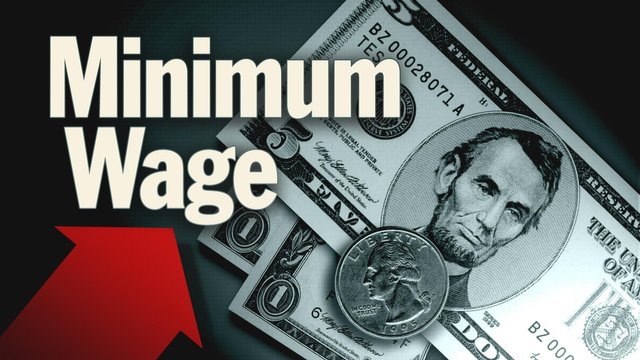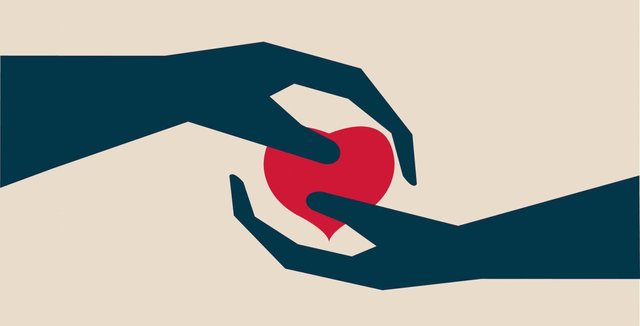Minimum Wage Economics and the Debate for Humanity
Going to school for economics, you realize that ultimately many of your ideas clash with economic theory, specifically in the case of what is the better economic decision versus the humanitarian one. Public policies are almost always trying to find a balance of the two that will give a net benefit to the population that isn’t measured in dollars, but in overall quality of life. It is easy to choose a decision that makes the most economic sense, but also ends up hurting the people that elected you to represent them.

The main case I want to talk about it minimum wage because it constantly comes up again and again in political debate. I want to be clear, I don’t think a minimum wage is the best economic decision, but I do believe it is a humanitarian one that needs implementation. Speaking in economic terms, someone should be paid only the value they bring to a company and many jobs that are mindless and done by younger people, are worth very little. This is the main reason why companies are looking to machines to do the labor instead of people, they don’t have to pay them a minimum wage.
Minimum wage opponents will usually say minimum wage pushes away companies from hiring more people and lowers economic growth, which is true, but they don’t take into account the trade off of wellbeing. Until we hit a point where we can replace all labor with machines, companies will always need to hire people to do monotonous work and most of the time that work is going to be done by under qualified, younger people. However, there are still many cases where the people doing minimum age labor are actually adults trying to support themselves on their own.

While many economists completely disagree with what im about to say, I believe that everyone who works a job, should be able to afford to at least exist. They don’t need to be able to afford every luxury, but they should be given enough in order to be able to pursue higher learning if they so desire. I want to live in a country where it doesn’t matter the situation you are born into, but rather your dedication and work ethic that helps you ascend into a higher class. Especially in the United States, which is so wealthy, we benefit from people having a minimum wage job that actually gives them a reason for living.
When people have reason for living, they commit less crime, create less social violence and well being is optimized. It doesn’t matter if you are a billionaire in a country where the majority of people are jobless because the social unrest won’t make it a good place to live. The government spends so much money on bad spending habits, but supporting our own citizens is a point of debate. A minimum wage might not be the best choice economically, but I believe that it is a monetary sacrifice we need to make in order to allow the best possible lives for everyone in our country.

Thanks to @Elyaque for the badges
But if minimum wage prevents companies from hiring people, then fewer people will be able to "afford to exist". Is it not better for there to be more jobs so that people can earn money--even if they do not support a lifestyle without supplementation--than to have fewer jobs that do support a lifestyle on their own?
There are, after all, many situations in which people might not need a "living wage" from their job. You mentioned younger people who are likely to live with their parents. There are also retirees who already own their homes and receive social security or pensions, who just want a little extra income. There are mentally and physically disabled people who are afforded a little autonomy by having a simple, part time job. There are entrepreneurs and students who take part time jobs to help them while they complete their studies or launch their businesses. There are teachers who take jobs during summer breaks.
So many people in those types of situations lose the ability to find work every time the minimum wage is raised, as companies lay off employees and cut hours in order to be able to afford to pay the new minimum, or switch to automation. So many small businesses are endangered by these wage hikes, as well. This type of legislation really favors large corporations at the expense of small businesses and startups. It doesn't seem very humanitarian to me to pass arbitrary rules that prevent people from being able to find work on their own terms.
I'm run a small business. I can't afford the proposed new minimum wages. BUT I wish I could. I have a few awesome employees who deserve everything. BUT I need to be helped to be able to help my staff. And then I feel furious about government control. They take every bit of extra cash for themselves while I suffer and my staff suffer.
Exactly @lesliestarrohara
It's maybe "humanitarian" in the moment, and then a ripple effect of devastation to the people you were trying to help (people who don't need additional challenges).
I can't add anything to what you've said, but just want to say that frankly I'm tired of people being categorized as not "humanitarian" (or implied to be that) because they happen to understand that this is the effect.
(Of course it's a projection, and we're actually the humanitarians, whether or not we go around calling ourselves that.)
@caleber24p, you can't separate the economics from what's humanitarian.
It's like saying "ignoring human physiology, let's give a huge dose of methamphetamine". The physiology is why it's bad to do that.
The economics is the point. It explains what the effects are on people, and the humanitarian thing is to consider it.
I concur that the most free market (especially today with widespread technology use and instant communication) we have the best chance to get the best outcomes. Small business won't be encumbered by rules, and everyone literally (most people never mention this) won't be bogged down mentally by the simple state of there being so many laws on the books they have to worry about to run a business!
Some business doesn't pay enough or is unfair? FINE, start your own business, switch companies, post a bad review, tell your friends the experience, do your best to chastise them and I bet the situation will change. Companies can so easily get bad PR with social media that it's really hard to be a jerk these days UNLESSS they're a jerk because they have to abide by draconian laws.
humans becoming kiosk. lols.
How about inflation...the hidden tax?! We have a currency created out of thin air by the Federal Reserve (nothing federal about them) that the government borrows on interest. Each year the inflation eats into your purchasing power causing prices to increase all around. Look at the value of the dollar today compared to 1913 when the Federal Reserve was put into power. On top of that add wasteful spending by the government and wars (pure rackets for powerful individuals) to further weaken the dollar. We live in a society that encourages spending and debt, and punishes the saver via inflation and low interest earned on safe investments. We are left with no choice but to increase minimum wage just to help people get by, instead we should be examining the root of the problem causing all of this.
This is very true! I agree that people should be paid a fair wage for a hard days work. I am a small business owner who has employed people in the past. It's a very tough environment. I have never paid anyone other than myself the minimum wage always better. However the mandated inflation caused by government policy is what is making the minimum wage so useless. If you force a minimum wage increase the government is gaurenteeing themselves more tax revenue as well. Employers have many things tied to the wage they pay. FICA taxes are a hefty 6.23% of the wage workers compensation is a percentage of the wage. In my case it is almost 3% and then things like 401k and other business insurance is tied as percentages of wages. That means a simple minimum wage increase also costs employers much more than the actual wage increase.
If we fired the politicians and forced the monetary supply to be fixed so that the people closest to the inflation don't get an unfair advantage over Main Street that would be a good thing for everyday workers.
That being said I do believe there are jobs that shouldn't exist if they can't pay at least a fair wage. I don't know what that wage floor should be. I don't believe in the supposed free market principle of eliminating the minimum wage entirely because then there would be too many people in society that would be forced to work for ever diminishing wages as business owners pocket more and more at the expense of their workers. That leads to more crime and civil unrest as @calaber24p pointed out in the post.
There is a far superior alternative to minimum wage laws. Universal basic income. A UBI of $1000 per month would be effectively a wage increase of $6 per hour for anyone working 40 hours per week, higher for those working part-time, and it would be a net increase in income for 8 out of 10 households instead of affecting only those receiving lower wages than the minimum wage.
UBI would thus allow for the elimination of minimum wages, which would remove market distortions. People with basic income could work for less than the min wage, if they really wanted that job. For jobs people don't want, those employers would need to pay more, or invest in automation instead. Both are outcomes we want.
UBI is also something both the right and left can get behind, instead of only the left. Basic income is not left or right. It's forward.
Cheers!
I like that alternative. I prefer funding these things voluntarily, rather than through a government mechanism where typically they'll use most of it on initiating war or paying their own debts, and then give some crumbs to the supposed cause. But that aside, ya, this makes much more sense than a wage law.
If we want everyone to have basic means of survival, then it's best to accomplish that directly. If economics doesn't matter and we're just going for the humanitarian outcome, you may as well not require people to work at McDonald's to be able to live.
And then you don't have the distortions of companies who provide the things we need going out of business from the artificially high wage.
Robots will take 90% of the jobs soon and there won't be much work. People will live off government hand outs in the future because all we did was fight each other instead of evolving our systems and tactics. Power to the people. End the nanny state.
A minimum wage to do a mundane task that no one likes? Or how about give the silly jobs to the machines and create a universal peace dividend. :)
Calaber24p. UBI is a construct of capitalism which is driven By the unfair allocation of resources. Capitalism creates the ladder of opportunity and success that folks in the system can climb up. This ladder climbing drives the economy. UBI is designed for those who for whatever reason can not climb this ladder. In the zero marginal cost sharing society, the basic premis is equitable sharing of resources. if you contribute and add value, you get access to resources. When you add blockchain Monetary system, the need for large banks start to disappear. There is a need to pay for the infrastructure used by all in this space. Yes this is not taught in economics today. Great post upvoted and resteemed
yes it is abslutily right @calaber24p many off our study theory are doubt when we came in practically life and its not better idea to change labour with machins human have a thinking but machins and robots have not humans make machins its proof of that human work is better than robots..but many places machins are better work than a human but main thing is this human oprate this machin then after machin work
That depends. It mostly clashes with neolib economy model. You know, those who have been proved wrong again and again, like the austerity one.
The most idiotic point is the concrete view that only supply counts.
The logical result is that to increase output you lower wages. That is what you get said all the time.
But this totally ignores that there has to be someone who buys all this stuff.
So they have to search for buyers far away (increase markets). They have to make goods that break fast (planned obsolescence) and they have to fight things that makes people's life better but costs money - worker protection, health (diesel scandal right now, tobacco or asbestos in the US a few decades back) and so on.
When Germany finally introduced a minimum wage there was the usual "the world will end" rhetoric from the usual suspects.
Then when the wages rose at a record rate and the economy was also better then before, it was - of course - not because of the minimum wage that allowed people to buy stuff, but in spite of.
Prediction were for job loses of 1 to 2,5 million.
After the fact it settled down to a low 5-digit number mostly in those jobs that were extremely low paid before like private security in the night or hairdresser (who sometimes got as low as 50% of the new minimum wage).
@calaber24p absolutely that's a debatable topic and i am loving your article as i reads it spot on.
I think is important to have a policy of minimum wage, otherwise, you need to provide a universal income for the people who can not work.